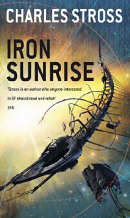Thursday, January 19, 2006

Title: Iron Sunrise
Author: Charles Stross
Publisher: Orbit
Moscow has been destroyed. Wiped out with illegal WMD. The wave of radiation is sweeping slowly through Moscow's outer lying moons, satellites and the like, each of those far enough out being evacuated to another system. The holocaust happened in the midst of a trade dispute with New Dresden, so it was assumed that they were responsible. So it is assumed that the slower than light speed stealth deterrent bombs that were launched were targeted at New Dresden. Unless something can be done another planet and her entire population will be destroyed.
Wednesday lives on Old Newfoundland, one of Moscow's space stations, when the iron sunrise hits. Before the evacuation, the imaginary friend that has been talking to her since she was 10 tells her to go for a walk. There she finds a corpse and a set of instructions that are so secret they've been hand written on paper. Instructions that are evidence of the crime. With members belonging to a group with a sinister new ideology on her tale on one side, UN special agents on the other and a traumatised warblogger the only obviously friendly face, Wednesday is on the run.
Iron Sunrise is the second novel in what Charles Stross seems to be referring to as his Eschaton series. Set in a future where an AI occurred, realised that the set up on Earth was dangerously unstable and that certain technological developments threatened its continued existence and took appropriate steps, attaining a certain godlike status in the process. I suppose the whole AI vs humanity thing suggests similarities to Ian McDonald's Ares Express that I read recently, though the two are entirely different novels. The characters Rachel Mansour and Martin Springfield were the leads in the first Eschaton novel, and reappear here in the sequel, providing a greater continuity than just setting another novel against the same background.
Singularity Sky was the first novel by Stross to be published in the UK, a novelist who is developing a strange career by managing to publish different sets of novels in different places. Reading Singularity Sky I had a background of reading some of his short story work - the material that became the novel Accelerando being particularly promising. At that point instead I found Singularity Sky disappointing, it wasn't a bad novel, but somehow it just didn't satisfy entirely. In the mean time I read Accelerando and it had exactly the material and potential that I was looking for from Stross. Giving me enough impetus to give Iron Sunrise a go despite any doubts. Which is just as well, as Iron Sunrise is far superior to Singularity Sky.
Iron Sunrise is far from perfect by any means. To a degree it seems that the first half of the novel is spent setting everything up, though the momentum for the second half of the book keeps you turning the pages. The narrative switches between the characters, so that at times you get a sense of repetition, as the thoughts of one character echo the thoughts of a previous. Which like the sense that there are perhaps some minor inconsistencies niggles a little as you read. But on the whole, any issues with Iron Sunrise are really on an editorial level.
Iron Sunrise is at the fore front of space opera, mixing in a heady dose of social commentary and politics to give it a more solid contemporary and relevant feeling than much of the competition. Including more of the elements that make Accelerando essential reading and less of the flaws that made Singularity Sky underwhelming.
Comments:
Post a Comment
 this is the voice of re:mote induction.
this is the voice of re:mote induction.